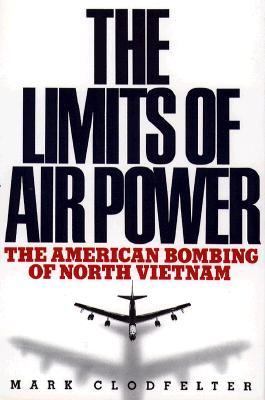
Book
|
The limits of air power : the American bombing of North Vietnam
Copies
63 Total copies, 17 Copies are in,
46 Copies are out.
Title
The limits of air power : the American bombing of North Vietnam
Call No
DS558.8
Authors
Subjects
PACOM. (local)tlcaut494382671185600
United States. Air Force--History--Vietnam War, 1961-1975.
United States. Air Force--History.--Vietnamese Conflict, 1961-1975. (DLC)n 79126811
UNITED STATES. AIR FORCE--HISTORY--VIETNAMESE CONFLICT, 1961-1975.
United States. Air Force. fast (OCoLC)fst00538280
Vietnam War, 1961-1975--Aerial operations, American.
Air power--United States--History.
Luftangriff
Vietnamkrieg
Luftkrieg
Vietnam War, 1961-1975--Aerial operations, American.
Air power--United States--History.
Air power.
VIETNAMESE CONFLICT, 1961-1975--AERIAL OPERATIONS, AMERICAN.
Air power--History.
Military operations, Aerial--American.
Air power.
Luftangriff
Vietnamkrieg
Luftkrieg
Arméflyg--historia--Förenta staterna.
Vietnamkriget 1961-1975--flygoperationer.
Vietnamese Conflict, 1961-1975--Aerial operations, American.
Air power--United States--History.
USA
United States.
USA
Air powerHistoryUnited States
United States / Air ForceHistoryVietnam War, 1961-1975
Vietnam War, 1961-1975Aerial operations, American
History.
United States. Air Force--History--Vietnam War, 1961-1975.
United States. Air Force--History.--Vietnamese Conflict, 1961-1975. (DLC)n 79126811
UNITED STATES. AIR FORCE--HISTORY--VIETNAMESE CONFLICT, 1961-1975.
United States. Air Force. fast (OCoLC)fst00538280
Vietnam War, 1961-1975--Aerial operations, American.
Air power--United States--History.
Luftangriff
Vietnamkrieg
Luftkrieg
Vietnam War, 1961-1975--Aerial operations, American.
Air power--United States--History.
Air power.
VIETNAMESE CONFLICT, 1961-1975--AERIAL OPERATIONS, AMERICAN.
Air power--History.
Military operations, Aerial--American.
Air power.
Luftangriff
Vietnamkrieg
Luftkrieg
Arméflyg--historia--Förenta staterna.
Vietnamkriget 1961-1975--flygoperationer.
Vietnamese Conflict, 1961-1975--Aerial operations, American.
Air power--United States--History.
USA
United States.
USA
Air powerHistoryUnited States
United States / Air ForceHistoryVietnam War, 1961-1975
Vietnam War, 1961-1975Aerial operations, American
History.
Language
English
Published
New York : Free Press ; London : Collier Macmillan, ©1989.
Publication Desc
xv, 297 p. : map ;
ISBN
0029059909
LCCN
88036710
Dimensions
25 cm.









